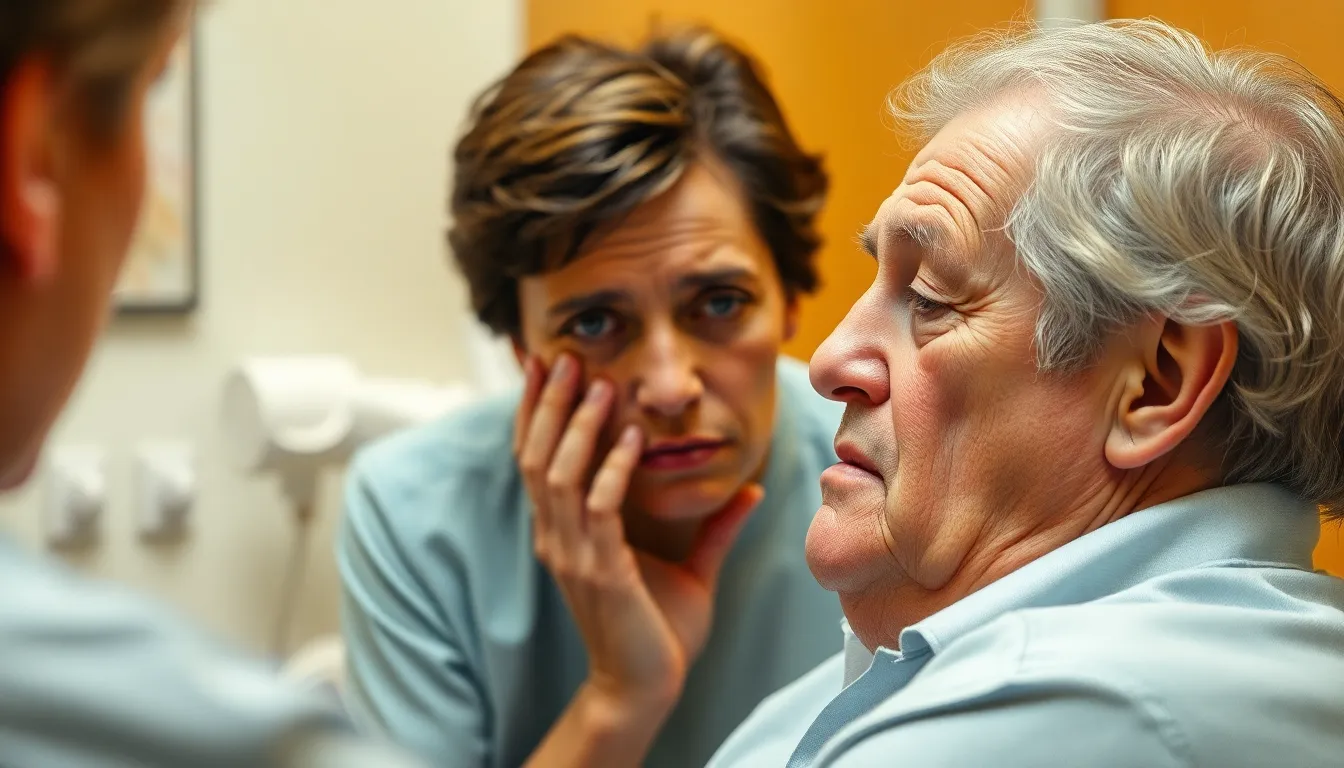Table of Contents
ToggleDrooling isn’t just a childhood concern; it can suddenly affect adults too. When adults experience an unexpected increase in saliva production, it can be both embarrassing and alarming. Understanding the causes and implications of this sudden onset is crucial for addressing the issue effectively.
Various factors can contribute to adult drooling, from neurological disorders to medication side effects. It’s essential to recognize that this symptom often signals an underlying health condition. By exploring the reasons behind this phenomenon, individuals can seek appropriate medical advice and regain control over their health and comfort.
Understanding Sudden Onset of Drooling in Adults
Sudden drooling in adults may signal various health issues. Identifying the underlying cause is crucial for effective treatment. Potential causes include:
- Neurological Disorders: Conditions such as Parkinson’s disease, stroke, or multiple sclerosis disrupt normal swallowing and saliva control.
- Medications: Certain drugs, including antipsychotics and medications for motion sickness, can result in increased saliva production or impaired swallowing.
- Mouth and Throat Conditions: Infections or injuries affecting the mouth and throat may lead to discomfort and difficulty in swallowing, causing drooling.
- Allergies: Allergic reactions can provoke increased saliva production, contributing to drooling episodes.
- Gastroesophageal Reflux Disease (GERD): GERD can result in excessive saliva due to irritation in the esophagus.
Recognizing additional accompanying symptoms enhances the ability to pinpoint the cause. Symptoms might include difficulty swallowing, facial drooping, or persistent dry mouth, indicating a more profound health issue. Immediate medical consultation provides the best approach to identify causes and explore treatment options.
Causes of Sudden Onset of Drooling

Sudden drooling in adults can stem from several underlying causes. Understanding these causes helps in determining the appropriate response and treatment.
Neurological Conditions
Neurological conditions frequently contribute to the sudden onset of drooling. Parkinson’s disease disrupts the coordination of swallowing and saliva control, leading to drooling. Stroke can impair muscle control in the face and mouth, triggering excessive saliva accumulation. Other conditions, such as multiple sclerosis and amyotrophic lateral sclerosis (ALS), also adversely affect nervous system function, resulting in drooling.
Medications
Certain medications can cause increased saliva production or impair swallowing abilities, leading to drooling. Common classes of drugs associated with this symptom include antipsychotics, some antidepressants, and medications for Alzheimer’s disease. Patients experiencing new drooling after starting any medications should consult their healthcare provider to evaluate the correlation.
Oral Health Issues
Oral health issues frequently result in drooling as well. Infections, such as oral thrush or periodontal disease, can lead to discomfort during swallowing, increasing saliva retention. Dental problems, including missing teeth or ill-fitting dentures, may disrupt oral function, causing drooling. Individuals experiencing oral health-related drooling should seek dental consultation for assessment and treatment options.
Symptoms Associated with Sudden Onset of Drooling
Sudden onset of drooling may present alongside various symptoms that indicate underlying health issues. Recognizing these symptoms is essential for identifying the cause.
- Difficulty Swallowing: Individuals may experience challenges while swallowing food or liquids, which may enhance the drooling effect.
- Facial Drooping: Asymmetrical facial appearance, particularly around the mouth, may accompany drooling, suggesting potential neurological issues.
- Persistent Coughing: Frequent coughing episodes could arise, indicating aspiration or airway irritation related to excessive saliva.
- Sore Throat: Feeling discomfort or pain in the throat may signal associated conditions, such as infections or gastroesophageal reflux disease (GERD).
- Changes in Speech: Slurred or unclear speech can occur, reflecting coordination difficulties in the mouth and throat muscles.
- Frequent Saliva Production: An increase in saliva, separate from drooling, may suggest specific medical conditions or reactions to medications.
- Bad Breath: Unpleasant oral odor might arise from bacterial growth due to excessive saliva pooling in the mouth.
- Nausea: Individuals may feel nauseated, which can coincide with other gastrointestinal issues linked to drooling.
Monitoring these symptoms can aid healthcare professionals in diagnosing the root cause of sudden drooling and facilitating appropriate treatment strategies.
Diagnostic Approaches
Determining the cause of sudden drooling in adults requires a thorough diagnostic approach. Healthcare professionals utilize clinical evaluations and various imaging tests to identify underlying conditions.
Clinical Evaluation
Clinical evaluation begins with a comprehensive medical history and physical examination. Healthcare providers assess the patient’s symptom onset, frequency, and any accompanying issues, such as difficulty swallowing or facial drooping. Neurological examinations may target reflexes, muscle tone, and coordination to identify potential neurological disorders. Collaboration with specialists, such as neurologists and ENT (ear, nose, throat) doctors, often enhances diagnostic accuracy.
Imaging and Tests
Diagnostic imaging plays a crucial role in identifying structural or functional abnormalities. Common imaging techniques include:
| Imaging Technique | Purpose |
|---|---|
| MRI | Detects brain abnormalities or lesions |
| CT Scan | Identifies structural issues in the brain |
| X-rays | Assesses oral and throat conditions |
Additional tests may include saliva analysis and swallowing studies to evaluate saliva production and swallowing mechanics. If medication side effects are suspected, a review of the patient’s current prescriptions and dosages can assist in determining the connection between medications and increased saliva production.
Treatment and Management
Effective treatment and management of sudden drooling in adults depend on identifying the underlying cause. Medical professionals often employ a combination of medications and lifestyle modifications to address symptoms.
Medications
Medications may help manage excessive drooling by targeting its root causes. Anticholinergic drugs, including glycopyrrolate and atropine, reduce saliva production. Botulinum toxin injections can temporarily decrease saliva flow by blocking nerve signals to the salivary glands. In cases where drooling relates to neurological conditions like Parkinson’s disease, specific dopaminergic medications may stabilize symptoms. Regular consultation with a healthcare provider ensures appropriate medication choices tailored to individual needs.
Lifestyle Modifications
Lifestyle modifications play a vital role in managing drooling. Practicing good oral hygiene helps prevent infections that may contribute to increased saliva production. Staying hydrated aids in maintaining throat lubrication while minimizing excessive drooling. Adopting posture adjustments during meals can enhance swallowing control. Engaging in exercises that strengthen oral and facial muscles may promote better control over saliva. These changes, combined with professional guidance, can significantly improve comfort and reduce the occurrence of drooling.
Sudden drooling in adults can be a distressing symptom that shouldn’t be overlooked. Understanding its potential causes is essential for effective management and treatment. By seeking medical advice promptly, individuals can uncover the underlying issues contributing to this condition.
Early intervention not only aids in diagnosis but also opens the door to various treatment options tailored to the specific cause. Whether it’s adjusting medications or implementing lifestyle changes, addressing sudden drooling can significantly enhance overall well-being. Prioritizing oral health and maintaining open communication with healthcare providers can lead to improved outcomes and a return to comfort.




